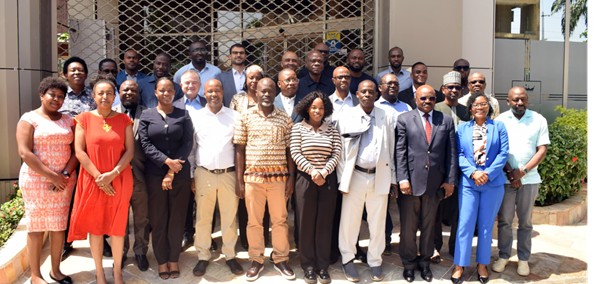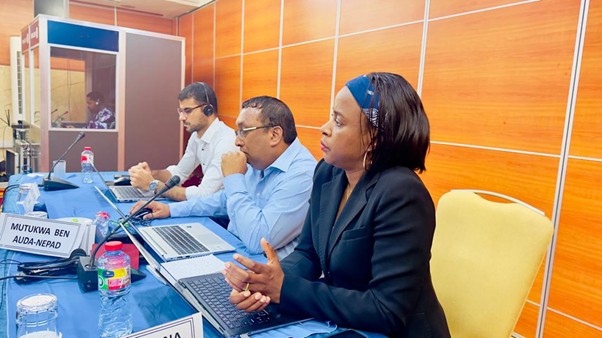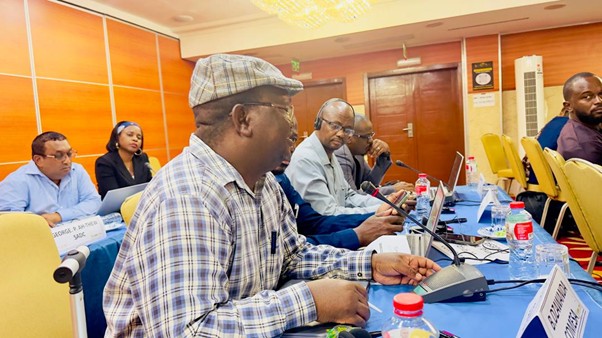In a decisive step toward advancing the implementation of the Second Phase of the Programme for Infrastructure Development in Africa (PIDA-PAP2), the PIDA Implementation Support Project (PISP) launched its first capacity-building workshop in Cotonou, Benin. The training was organized by the African Union Development Agency (AUDA-NEPAD), in collaboration with the African Union Commission (AUC) and the German Corporation for International Cooperation (GIZ) and brought together more than 40 experts from Regional Economic Communities (RECs), project sponsors, and infrastructure corridors across Africa.
 The workshop marked the first in a three-part training series under PISP, aimed at strengthening early-stage project preparation and enhancing the bankability of priority projects within the 2021–2030 PAP2 pipeline.
The workshop marked the first in a three-part training series under PISP, aimed at strengthening early-stage project preparation and enhancing the bankability of priority projects within the 2021–2030 PAP2 pipeline.
The Cotonou session focused on two foundational themes:
- The PIDA Implementation Tools, including the PIDA Quality Label (PQL) and the Digital Platform for the PIDA Service Delivery Mechanism (SDM)
- Strategic planning and project management for cross-border infrastructure
The PIDA Implementation Support Project (PISP), a US$7 million initiative supported by African Development Bank (AfDB) aims to strengthen the technical and institutional capacity of PIDA stakeholders to drive the effective implementation of regional infrastructure projects. The ongoing training series is one of several targeted interventions under the broader programme, designed to equip key actors with the tools, frameworks, and knowledge required to move projects from concept to bankable investment opportunities.
“This training is not just a learning moment; it’s part of the efforts AUDA-NEPAD is excreting with PIDA stakeholders to enhance the bankability and investment readiness of PIDA Projects. PIDA projects need to be technically sound, climate-aligned, and ready to engage financing partners. That starts with strong preparation,”
Opening remarks by AUDA-NEPAD, AUC, and ECOWAS (the hosting REC) echoed this spirit of urgency and ambition, particularly as PIDA-PAP2 approaches its mid-term review milestone.
“It is high time to accelerate the implementation of PIDA-PAP2. We are already at the halfway mark of this phase and must work in close collaboration to deliver results. The Cotonou training is timely, enabling a collaborative approach anchored in the AUC’s policy leadership and AUDA-NEPAD’s technical delivery. We must ensure that the outcomes take us a step forward in making prioritised projects truly investment-ready so they can be transformed into actual infrastructure that drives Africa’s integration and development.”
George Aoko, PIDA & Flagship Projects Coordinator.
 From Tools to Action—Project Readiness in Practice
From Tools to Action—Project Readiness in Practice
Participants engaged in a blend of plenary sessions, hands-on exercises, and group discussions tailored to the challenges of early-stage project preparation. The session on the PIDA Quality Label (PQL) introduced an assessment framework that certifies the readiness of infrastructure projects in the PIDA pipeline. A live demonstration using an actual project file illustrated how the tool supports project screening, structuring, and promotion.
“The session on the Quality Label was eye-opening. It showed us how to critically assess our own projects and see them through the eyes of potential financiers,”
Day 2 shifted the focus to strategic infrastructure planning, highlighting why many infrastructure projects across Africa are delayed. The agenda covered enabling environments, stakeholder coordination, and institutional clarity. The sessions examined real-life obstacles and mapped out solutions grounded in corridor-level experiences.
Managing Projects for Performance and Transparency
Day 3 was dedicated to infrastructure project management covering the full project cycle from initiation and planning to execution, monitoring, and closure. The sessions also delved into the role of human resources and digital tools in strengthening project delivery, transparency, and institutional memory.
“We all agreed, it’s rare to receive this level of tailored, practical guidance. It helps us better coordinate regionally and build projects that meet investor expectations,”
A shared sentiment emerged among project owners and REC representatives: the training was both timely and relevant.
 What’s Next? Scaling Capacity and Mobilising Finance
What’s Next? Scaling Capacity and Mobilising Finance
As part of its broader technical assistance package, PISP is currently supporting 22 regional projects with expertise from the Expert Service Pool (ESP). The next training sessions will dive deeper into:
- Climate and project finance
- Private sector participation and PPPs
- AI and data analytics in smart infrastructure
These upcoming topics are central to unlocking long-term financing and achieving the goals of Agenda 2063.
For Media Inquiries:
Bezayit Eyoel
Information Analyst
Department of Infrastructure and Energy
African Union Commission
E-mail: BezayitE@africa-union.org
